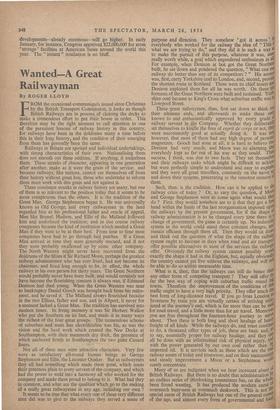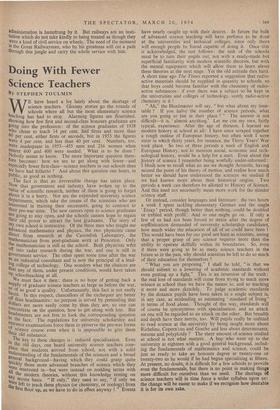Wanted—A Great
By ROGER LLOYD FROM the occasional communiques issued since Christmas by the British Transport Commission, it looks as though British Railways are in process of clearing the decics to make a tremendous effort to put their house in order. This therefore may be the right moment to call attention to one of the persistent lessons of railway history in this country, Railways in Britain are spirited and individual undertakings, with strong characteristics of their own. Nationalising them does not smooth out these oddities. If anything, it underlines them. These streaks of character, appearing in one generation after another, make as it were the grain of the service; and because railways, like nations, cannot cut themselves off from their history without great loss, those who undertake to reform them must work with this grain and not against it.
These consistent streaks in railway history are many, but one of them is so relevant to the position today that it seems to be more conspicuous than the others. It is the tradition of the Great Man. George Stephenson began it. He was universally known as Old George, and every railwayman in the land -regarded him as his professional father and oracle of appeal. Men like Brunel, Hudson, and Ellis of the Midland followed him and underlined the tradition; and in due course railway companies became the kind of institution which needed a Great Man if they were to be at their best. From time to time most companies have had to go through bad patches. If a Great Man arrived in time they were generally rescued, and if not they were probably swallowed up by some other company. The North Western might never have recovered from the doldrums of the fifties if Sir Richard Moon, perhaps the greatest railway administrator who has ever lived, had not become its chairman, and lived long enough to be, in effect, the whole railway in his own person for thirty years. The Great Northern would probably never have been built, and would certainly not have become the flourishing concern it always was, if Edmund Denison had died young. When the Great Western was near to bankruptcy Daniel Gooch was brought back from his retire- ment, and he saved it. The Midland always flourished becatise in the two Ellises, father and son, and in Allport, it never for a moment lacked a Great Man. The tradition has survived into modern times. In living memory it was Sir Herbert Walker who put the Southern on its feet, and made it in many ways the richest of the four great groups. The tremendous scheme of suburban _and main line electrification was his, as was the vision and the hard work which created the New Docks at Southampton, with their mammoth dry dock, the presence of which anchored firmly to Southampton the two giant Cunard purpose and direction. They somehow `got it across' to everybody who worked for the railway the idea of " This 0 what we are trying to do," and they did it in such a way L1J to make the pursuit of this purpose, whatever it was, see really worth while, a goal which engendered enthusiasm in 0,11 For example, when Denison at last got the Great Northert built, he sat down and pondered the question, " What can Dili railway do better than any of its competitors ? " His answer was, first, carry Yorkshire coal to London, and, second, provide the shortest route to Scotland. These were its chief assets and Denison exploited them for all he was worth. On them 114 fortunes of the Great Northern were built and sustained. Yorg' shire coal became to King's Cross what suburban traffic was t° Liverpool Street. These great railwaymen, then, first sat down to think 00,1 their ultimate ends, and afterwards to make those ends. known to and enthusiastically approved by every grade railway servant in the Company. Whether they deliberatk set themselves to kindle the fires of esprit de. corps or not, they were uncommonly good at actually doing it. It was noG however, that most of them had any high degree of persona' magnetism. Gooch had none at all; it is hard to believe ilia Denison had very much; and Moon was so alarming everybody kept as far out of his way as they could. The" success, I think, was due to two facts. They set themselve5 and their railways tasks which might be difficult to achieve but were perfectly simple to understand and easy to explain; and they were all great travellers, constantly on the move 11 and down their systems, penetrating to the remotest corners 01 them.
Such, then, is the tradition. How can it be applied to the railway crisis of today ? Or, to vary the question, if Moon and George Stephenson were to come again what would they do ? First, they would somehow see to it that they got a fly' hand within the limits of the last reorganisation imposed 41 the railways by the present government, for if the shape ° railway administration is to be changed every time there is change of government, the game is certainly up. No industrial system in the world could stand these constant changes, and remain efficient through them all. Then they would sit dow° and think out the question of what the shape of the railwil system ought to become in days when road and air transport offer possible alternatives to most of the services the railways offer. Obviously the railway system cannot possibly NO exactly the shape it had in the Eighties, but, equally obviousiY,' the country cannot yet live without the railways, and will it° be able to do so within measurable time.
What is it, then, that the railways can still do better 0,11 any other form of competing transport ? They still offer 1)2, far the best way of coping with suburban traffic round hip, towns. Therefore the improvement of the conditions of tb" traffic ought to have a very high priority. They offer much the best form of long-distance travel. If you go from LOndon Inverness by train you are virtually certain of arriving uni!1A' jured at the journey's end, which is far more than can be saw. for road travel, and a little more than for air travel. Moreover'' you are free throughout the fourteen-hour journey to inev°v about. Then there is both long and short haulage of hea'IY, freight of all kinds. While the railways do, and must continuo; to do, a thousand other types of job, these are basic and, s° to say, essentially proper for railway haulage; and they Cad all be done with an infinitesimal risk of physical injury, all with the power generated by our own coal rather than imported oil. It is services such as these which are the real railway assets of today and tomorrow, and on their maintenall and steady improvement a M'oon or a Stephenson wool surely concentrate. administration is hamstrung by it. But railways are an insti- tution which do not take kindly to being treated as though they Were a kind of civil service on wheels. The need of the moment is the Great Railwayman, who by his greatness will cut a path through this jungle and carry the whole service with him.











































 Previous page
Previous page